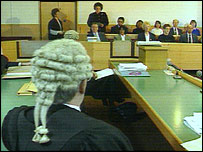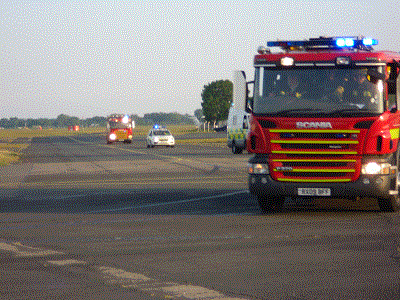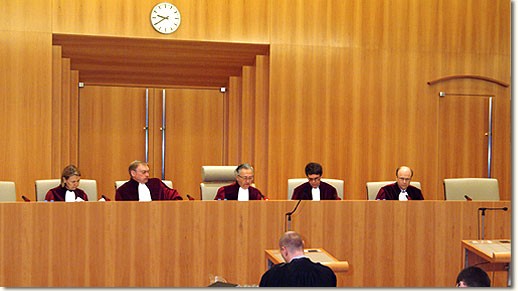Law Weblog
Significant rise in number of black people stopped and searched
Saturday 19 June 2010 at 9:02 am | In News | Post Comment The annual statistics on race and the criminal justice system reveal that black people are now seven times more likely to be stopped by the police than white people. This is a higher stop and search ratio than that recorded before the publication in 1999 of the inquiry report into the murder of the black teenager Stephen Lawrence. The report concluded that the overuse of stop and search had created significant mistrust in minority ethnic communities.The latest official figures show that the use of stop and search under section one of the Police and Criminal Evidence Act rose 10% in the past year to 1,142,763 searches. Of those, 15% were of black people, 9% of Asian people, 3% of mixed ethnicity and 1% were of Chinese background. Across the country the rate of stop and search per 1,000 population for black people compared with white, ranged from 9.1 times in Avon and Somerset to 0.7 in Cumbria and Durham, where the ratio of white people stopped was actually higher.
The justice ministry’s publication Race and the Criminal Justice System shows that black people continue to be disproportionately involved at nearly every stage of the process. The figures for 2008/09 show there were three times more arrests of black people than white people, based on per 1,000 population figures.
Report here
Jury trial in defamation cases
Friday 11 June 2010 at 5:57 am | In News | Post Comment The end of trial by jury in defamation cases came one step closer yesterday.The Court of Appeal upheld a ruling by Mr Justice Tugendhat last month that a libel action brought against Channel 4 by a former bodyguard to Michael Jackson, should be heard by a judge alone.
One factor was the issue of costs, around £3m.
The case raised important issues and was best be dealt with in a reasoned judgment which could be made public and appealed.
Today Ronald Thwaites QC said,
“At stake in this case is the future of trial by jury in defamation cases.
“If a judge can remove it, and be upheld, it is difficult to envisage any case where it can be successfully retained in the face of objection.
Lord Neuberger said that the Court of Appeal would explain its decision at a later date as the point at issue was one which merited a reasoned judgment.
Experimental chambers BarFutures set to close
Wednesday 9 June 2010 at 6:22 am | In News | 1 Comment The Law Socieny Gazette is reporting that the experimental virtual chambers BarFutures is to close its doors at the end of June after two years because of a ‘lack of appetite for change within the profession’.The alternative set was designed to meet the challenges posed by the Legal Services Act 2007 and give barristers a more cost-effective and time-efficient way to practise.
Rather than working in a traditional chambers, BarFutures provided management and marketing services and working accommodation in London and Manchester, to enable barristers to operate remotely and remain fully independent while benefiting from shared support.
It gave solicitors a more cost-effective and streamlined way to instruct barristers, using BarFutures’ own barristers, or the organisation’s nationwide network of affiliated chambers.
BarFutures director Ian Dodd told the Gazette:
‘When we set up two years ago we set some stretching financial targets. Despite achieving a turnover of £2m a year in our first 18 months and being able to cover all our costs, we couldn’t make the next step and failed to meet our targets.
More here
New Guidelines for Firefighters
Sunday 6 June 2010 at 12:14 pm | In News | Post CommentFire-fighters will be able to respond more effectively to dangerous situations, after the Health and Safety Executive issude a new policy statement which says that fire-fighters should not be prevented from doing their job of protecting the public. The fire service still has a duty under the Health and Safety at Work Act 1974 to protect their workers’ health and safety.
These health and safety duties are not absolute and each is qualified by the test of what is reasonably practicable. HSWA, therefore, does not require all risks to be eliminated, and HSE recognises that, even when all reasonably practicable precautions have been taken to deal with foreseeable risks, harm could still occur …
The new guidelines follow the findings of a Fatal Accident Inquiry in March where Alison Hume died following a fall of 40 feet down a disused mineshaft near Glasgow. Fire-fighters had been unable to rescue Alison Hume due to a Health and Safety memo which stated that their equipment was for saving themselves, not members of the public. Mrs Hume was eventually rescued by mountain rescue experts but died of a heart attack just before being brought to the surface.
HSE chair Judith Hackitt stated,
“Fire-fighters perform a unique and indispensable role. It is part of their job to intervene in dangerous situations to protect people and property. The law expects that they will themselves be protected as far as is reasonably practicable – but in fast moving situations they must exercise their judgement about what is reasonable and what is not.”
Full policy statement is here
Speak up if you wish to remain silent
Sunday 6 June 2010 at 7:35 am | In News | Post Comment The “Miranda warning” (Miranda v Arizona 1966, a rape case) is the US equivalent of the UK “Judges Rules” enshrined in PACE. It requires an investigator to inform a suspect that he has the right to remain silent.A Supreme Court decision this week overturned decades of legal precedent and police procedure by ruling that the burden is not on the police and prosecutors to make sure a defendant understands his rights. So from now on suspects must explicitly invoke their Miranda right to remain silent in order to avoid self-incrimination.
A Michigan man arrested for murder was read his Miranda rights but refused to sign a form stating he understood them, nor did he waive them. He remained silent until police asked him if he prayed for forgiveness for the fatal shooting. The man said “yes”, and that response was the basis for his murder conviction.
The Supreme Court upheld the conviction, saying the burden was on the defendant to unambiguously claim the right to silence.
In the words of one of the judges, “You have to speak up to stay silent”, the effect of the judgment is to “turn Miranda upside down.”
(UK police do not have to check that a person understands the meaning of the caution, but they frequently do)
ECJ allows ban on internet gambling
Saturday 5 June 2010 at 10:26 am | In News | Post Comment The European Court of Justice (ECJ) has ruled that European countries are within their rights to create gambling monopolies and to ban internet gambling companies from other EU countries operating.They said that though the EU is fundamentally a trading bloc founded on the principle of free trade between members, countries could restrict the gambling trade if they did it in a consistent way and to protect the interests of their citizens.
The Netherlands bans gambling except that conducted by one licensed operator in each of two markets: sports and lottery betting, and a horse racing totalisation service.
“Betfair” owner “Sporting Exchange” argued that it should be allowed to operate in the Netherlands and that EU free trade laws mean that it should not have to be regulated in the Netherlands when it had already been regulated in the UK.
The ECJ acknowledged held that while Article 49 of the EC Treaty outlawed restrictions on the freedom to trade across borders, Article 46 of that Treaty permits exceptions to it.
“[Article 46] allows restrictions justified on grounds of public policy, public security or public health,” said the ruling. “A certain number of overriding reasons in the public interest which may also justify such restrictions have been recognised by the case-law of the Court, including, in particular, the objectives of consumer protection and the prevention of both fraud and incitement to squander money on gambling, as well as the general need to preserve public order.”
“In that context, moral, religious or cultural factors, as well as the morally and financially harmful consequences for the individual and for society associated with betting and gaming, may serve to justify a margin of discretion for the national authorities, sufficient to enable them to determine what is required in order to ensure consumer protection and the preservation of public order,” it said.
But countries had to make sure that they could justify their decision.
“The Member States are free to set the objectives of their policy on betting and gambling according to their own scale of values and, where appropriate, to define in detail the level of protection sought. The restrictive measures that they impose must, however, satisfy the conditions laid down in the case-law of the Court, in particular as regards their proportionality”
Betfair argued that it should be able to operate in the Netherlands using its UK licence, but the Court said that this was not true in the case of the online betting industry.
“It should be noted in that regard that the internet gaming industry has not been the subject of harmonisation within the European Union”
“A Member State is therefore entitled to take the view that the mere fact that an operator such as Betfair lawfully offers services in that sector via the internet in another Member State, in which it is established and where it is in principle already subject to statutory conditions and controls on the part of the competent authorities in that State, cannot be regarded as amounting to a sufficient assurance that national consumers will be protected against the risks of fraud and crime, in the light of the difficulties liable to be encountered in such a context by the authorities of the Member State of establishment in assessing the professional qualities and integrity of operators.”
The Court said that a previous case involving online gambling firm Bwin had established that Internet betting was inherently more risky for consumers than shop-based betting.
“Because of the lack of direct contact between consumer and operator, games of chance accessible via the Internet involve different and more substantial risks of fraud by operators against consumers compared with the traditional markets for such games”
Rape suspects, anger by campaigners
Friday 4 June 2010 at 8:50 am | In News | Post Comment There was anger from campaigners last month when the coalition agreement, drawn up by the Tories and Liberal Democrats, included the pledge to keep the identity of rape suspects secret. It would have reinstated the anonymity rules repealed 12 years ago.At the time the measure was revealed, government sources suggested anonymity would only be lifted after a defendant had been through the courts and convicted. But speaking at his first Prime Minister’s questions, David Cameron suggested the new rules may only hide the identity of defendants until they were formally charged.
Women’s groups had argued the proposals would stop other rape victims coming forward, setting back plans to improve low conviction rates in rape trials. In a shift that appeared to pave the way for significantly watering down the scope of the anonymity changes, Mr Cameron conceded publicity around court cases can help bring other people who have been raped forward.
Despite welcoming the apparent clarification of the plans, the women’s rights campaign group, the Fawcett Society, warned even smaller reforms would be a step backwards.
Powered by WordPress with Pool theme design by Borja Fernandez.
Entries and comments feeds.
Valid XHTML and CSS. ^Top^






